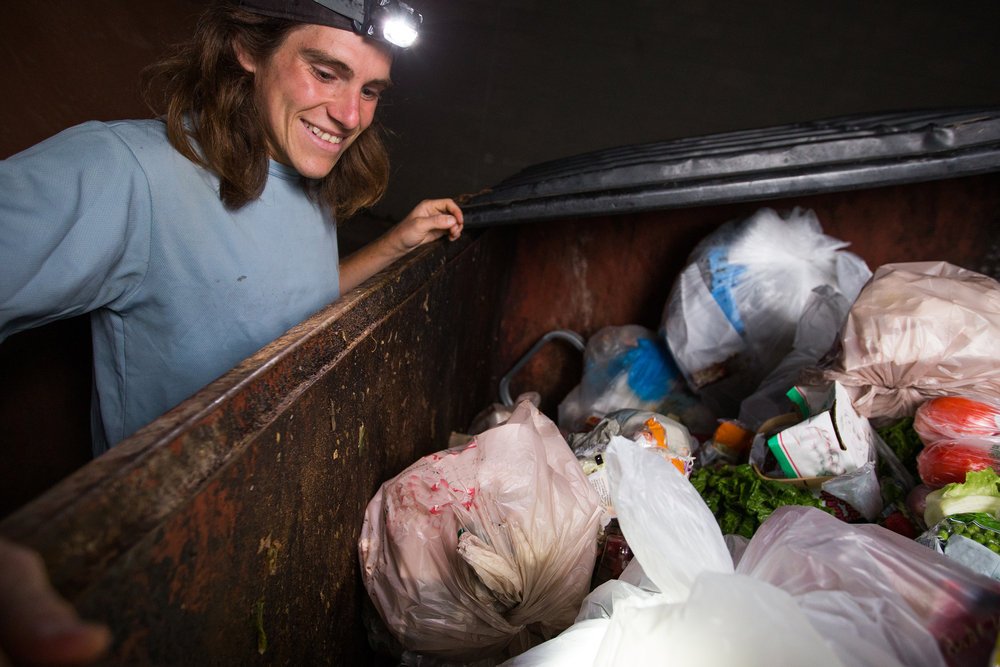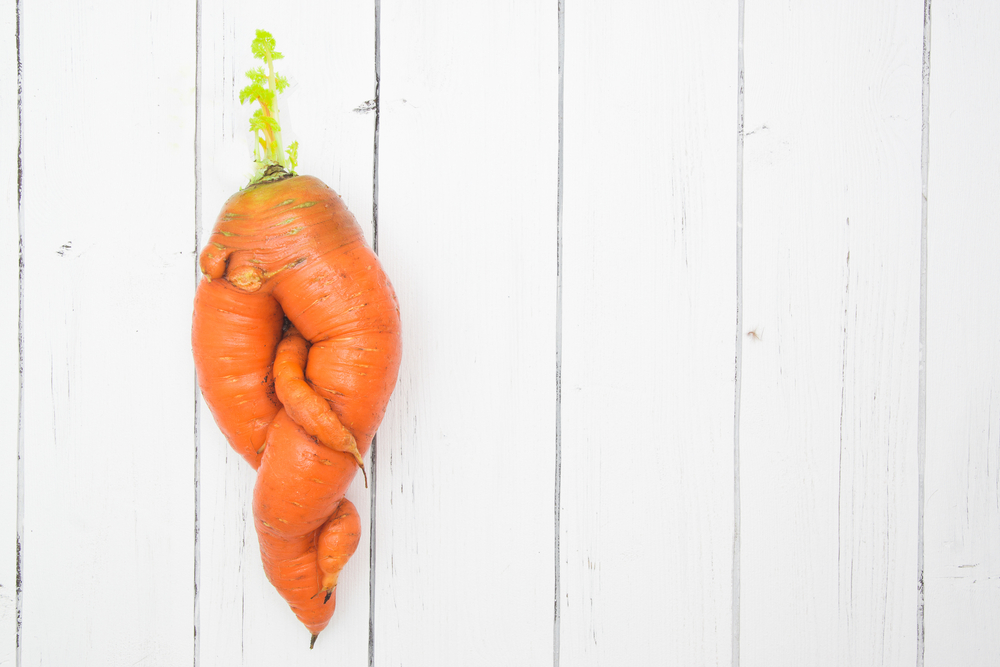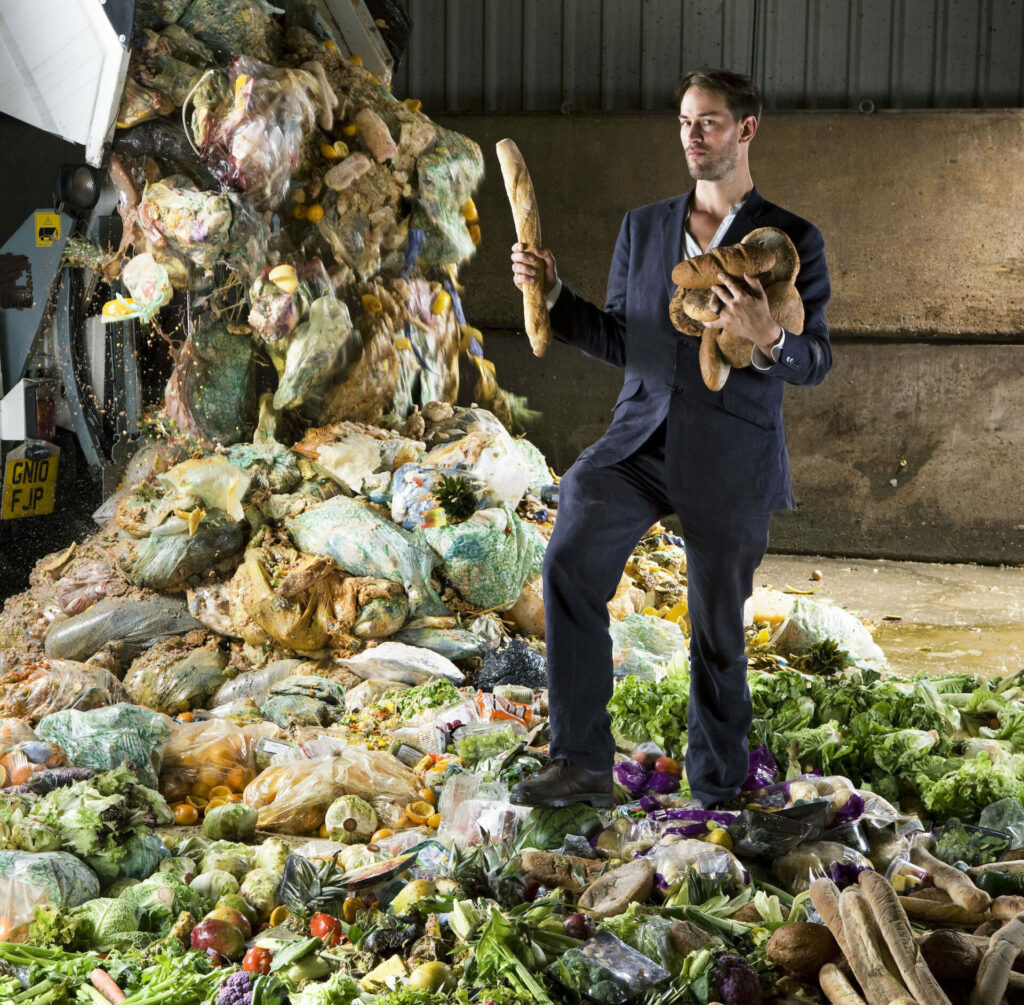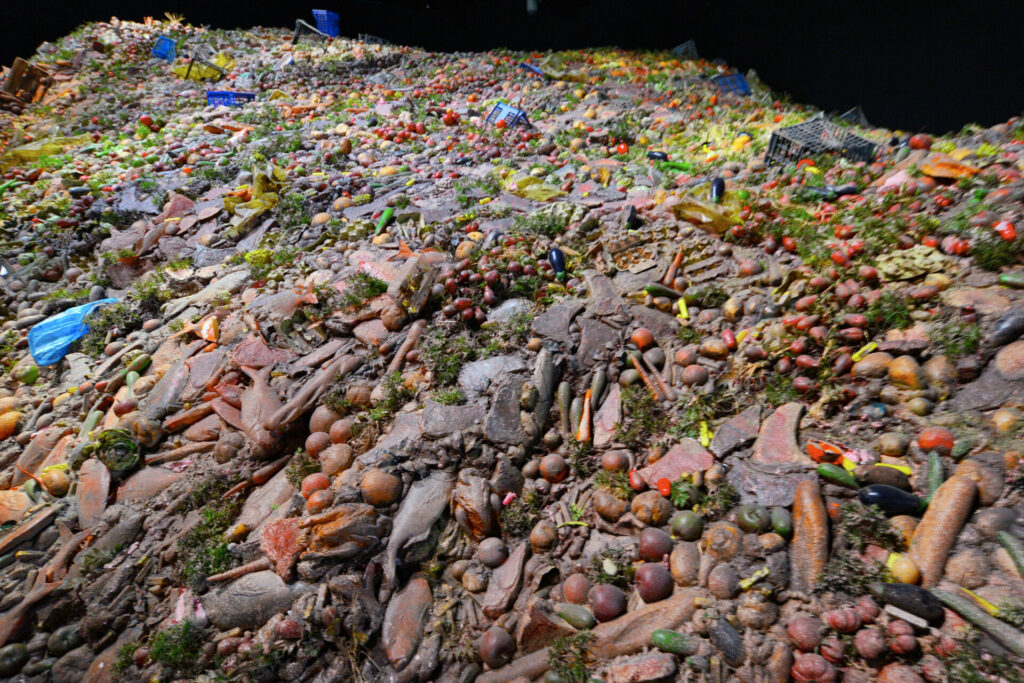It’s 9pm on a damp winter evening in the suburbs of London and I am standing in the drizzle in a loading bay behind a supermarket. It’s a large 24-hour outlet, so there is plenty of activity. My target lies inside a locked wooden enclosure. It is a bin. I approach nervously. A worker emerges from a side door and looks at me quizzically.
‘Can I look in your bins?’ I ask.
‘What for?’ he replies curtly.
‘My dinner.’
I’m not in the habit of rummaging through bins behind supermarkets looking for food. But I’m on a mission to discover whether stores persist in throwing away out-of-date, yet edible food.
Food Waste Trail
I’m on the trail of food waste and what I find is promising. It appears that in the UK and other progressive nations, the bad old days, when supermarkets habitually threw away thousands of tonnes of unsold food which ended up in landfill, are disappearing.

The UK’s largest supermarket chain, Tesco, for example, has dramatically reduced the amount of surplus produce fit for human consumption it generates. Five years ago 5,700 tonnes of surplus food from its stores was donated to charity, 16,605 tonnes were used to make animal feed and 16,391 tonnes went to anaerobic digestion facilities and energy recovery schemes.
Discarded food is typically sent to landfill where it releases greenhouse gases into the atmosphere, further harming the environment
Now it works with charity network FareShare and food sharing app OLIO to ensure even more surplus food is ‘diverted to the people who need it most’, but the supermarket also pledged to halve food waste by 2025.
The company is to align executive pay and bonuses to ‘achieving key sustainable measures’ across the business and says that halving food waste by 2025 would put them five years ahead of the 2030 United Nations sustainability goal.
Tesco is not the only food retail giant to be taking food waste seriously. In the last few years, several eye-catching initiatives have raised public awareness of the scale of wasted food.
Across many countries there has been public outcry when activists have exposed how millions of tonnes of edible produce is simply thrown away because it has been on the shelves too long or because it fails to meet standards set by retailers.

For example, millions of misshapen vegetables were routinely rejected by stores, which argued that consumers were put off by less-than-perfect produce. Following pressure from campaigners, retailers such as Tesco, now sell this produce cheaply under specific brand names. Tesco’s, for example, is the Perfectly Imperfect range.
Dumpster Diving
Which is good news for the environment, but not such good news for the Freegan movement; a quirky sub-culture of environmentally-friendly activists who go ‘dumpster diving’ for free food to eat or to distribute to those in need.
Des Kay, from Kingston upon Thames in Surrey was one of the pioneers of the freegan movement in the UK. He has been a freegan for over 40 years and runs the charity, Save The World Club, which collects and distributes food legitimately to families and vulnerable people. He advises me that once bins would have been laden with goodies, but that my efforts to find dinner in the bins behind grocery stores today will most likely end in disappointment.
‘I still get free food from shops and redistribute it to charities,’ he says, ‘but what changed is that supermarkets are all on the case now and they work with different organisations to ensure the food gets distributed fairly. This means much less food ends up in landfill. Bin diving doesn’t happen so much now because there isn’t much available. There are still a few places, like the back of some petrol stations, but on the whole things are much better.’
The practice of ‘rescuing’ food from bins is legally questionable. Although the food has been thrown away and is destined for landfill, the food still belongs to the outlet disposing of it until it is taken away, at which point it becomes the property of the authority charged with disposing of it. In the early days of the freegan movement, many shops and restaurants would take extreme measures to discourage the practice.
Des explains: ‘They would put dye or bleach on the food. They have woken up to the fact that most of it is perfectly edible. I have fed myself and thousands of others over the years and have never had a problem with feeling ill afterwards.’
Freegan Movement
Another pioneer of the freegan movement is Brit Tristram Stuart, who founded the campaign group Feedback. Tristram is an international award-winning author, speaker, campaigner and expert on the environmental and social impacts of food waste.
He explains: ‘The job of uncovering the global food waste scandal started for me when I was 15. I had livestock and fed them in the most traditional and environmentally-friendly way.

‘I went to my school kitchen and asked for the scraps my school friends didn’t eat. I got stale bread from the baker, and potatoes from a farmer who was throwing them away because they were the wrong shape or size for supermarkets.
‘I noticed most of the food was fit for human consumption and that I was only scratching the surface; that all the way up the food supply chain, in supermarkets, factories, farms and homes, we were haemorrhaging food. Supermarkets didn’t even want to talk to me about how much food they were wasting.’
Tristram started to expose the issue by initially inviting press photographers along to freegan bin raids. He researched global food waste and wrote a prize-winning book about the problem, Waste: Uncovering the Global Food Scandal.
He tells The Ethicalist: ‘When I started, I was fumbling around in bins at the back of supermarkets to see what I could find and to show what was being thrown away. Now we have most of the big chains interested in tackling this problem. Most of the big supermarkets have food waste policies. There is much better public awareness. There has been a global food waste revolution.
‘There have been some massively successful campaigns to reduce food waste and it is an issue that has been addressed company by company in their stores. The next focus is to address the reported waste in their own supply chains.’
In addition to the power of public awareness, which has undoubtedly forced retailers to look at their practices, new technology is also helping. OLIO is a free food-sharing app connecting people with their neighbours and with local shops, so surplus food and other items can be shared, not thrown away. Karma is a similar app through which restaurants, cafes and grocery stores can sell good surplus food to consumers who rescue the food at lower prices, collecting it as a take-away.
Food Waste In The UAE
The movement to cut food waste has become truly global – a staggering 30 per cent of global food production, 1.3 billion tonnes, is wasted annually, according to the United Nations, and the issue has deep resonance in the UAE, which is one of the most proactive nations addressing the problem.
The Government here aims to reduce food waste by 50 per cent by 2030. ‘Because the UAE imports 90 per cent of its food, food safety and security are the top priority,’ Mariam Al Mheiri, Minister of Climate Change and Environment and Minister of State for Food Security said in 2020.
In the UAE, the annual value of food waste is estimated to be around 14.69 billion dirhams with statistics showing that nearly 40 per cent of daily waste produced by residents is food – around 224kg a year, which is more than twice that in the US and Europe.
Households are the largest food waste generation sector, and the most common foods wasted are fruit and vegetables. Many initiatives have been created to deal with all this discarded food, which is typically sent to landfill where it releases greenhouse gases into the atmosphere, further harming the environment.
Along with campaigns to raise public awareness, food banks and using the discarded food to make biofuel, simple strategies, such as planning meals a week ahead and using shopping lists to avoid impulse buys helps to reduce waste.
Other tips include buying loose items and composting food waste, which can potentially divert up to 150kg of food waste per household per year from rubbish tips.

Public awareness and the momentum against the scandal of food waste around the world while millions continue to starve continues to grow, yet the issue remains huge. Globally, about US$1 trillion worth of food is wasted each year, which is equivalent to about 1.5 percent of the worldwide economy. The future does look positive, however.
On my investigations, I found no evidence of unnecessary waste and so, with more ingenious solutions and concerted effort to consume more mindfully, it seems probable that, like me, the freegans of the future will be going hungry.









